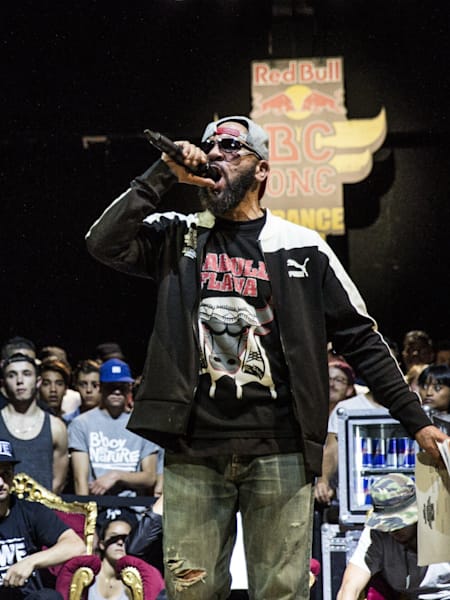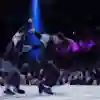Some people might tell you that an event host has two jobs – to introduce the dancers and to tell the crowd to make noise. But anyone paying attention will have to notice that hosts have to play many different roles to perform their job well.
Here are nine things that a host does you maybe didn't even realise they were doing.
1. They’re entertainers
From Ivan the Urban Action Figure backflipping off speakers and freestyle rapping on the mic to Mario B's well-known Tarzan roar and resonating announcement that “It's battle time,” the host is the one constant face and voice audiences see before, during and after each battle. If a host doesn't have an entertaining, witty, engaging personality, audiences will quickly be mumbling, ‘Can you shut up and get to the battles?'
2. They own all things time, schedule and round-related
Hosts know:
- What time the prelims start and finish.
- What time the main battles starts.
- What category or style is first, second and last, if there’s more than one.
- How long the battle is if it's timed and when that time limit is up.
- How many rounds each battle will be and when those rounds are over.
Also, if an event is running behind schedule, the host will try and make up that time. They even know how long you’ve got to go to the toilet, grab a drink or get something to eat!
3. They’re usually the only person who’s a constant throughout the event
Judges don't always judge every battle category. There are usually at least two DJs at an event, so one doesn't have to spin for every battle. The competitors do their round then get to rest while the other battles go on. But hosts are usually on the mic for the whole event. Even if there are two of them they’re partners in crime for the day, always together, you never see or hear one without the other. A host is always working.
4. They’re the only ones who have to know everyone's name
Hosts introduce everyone to the audience; the judges, the competitors, the DJs, any special guests or performers, they need to know all their names. This means they need to learn to pronounce even the most obscure or crazy made-up dancer nickname or alias. Even when there are over 300 dancers competing, if the host gets one name wrong they get looked at like they just committed a terrible sin.
5. They're commentators
Whether it's Amjad from Seven Dollars Crew dropping one of his famous lines, like, 'Losing the hat, losing the points' or Crazy Legs at the UK B-Boy Championships letting you know that, 'Someone's messing up right now,' hosts have always been the original commentators, keeping the crowd informed during a battle. Official commentating is slowing being introduced at more and more events, but for those who are there live, the host has always been the one who brings that commentary.
6. They have to be all-knowing
If you have a question at an event you ask the host. Not because the host is actually who you should be asking, but because they have a microphone, are in the middle of the action, and seem to know everything. So, a host must be ready to be bombarded with every question from, 'What time do the battles start?' to 'Where's the after party?’ ‘Can I get in with my wrist?’ and ‘Why is it taking so long to start the battle?'
7. They’re security and keepers of the peace
From clearing the floor of cyphers, to being firm with audience members who sit too close to the battle area or block the DJ's view – and even to politely pushing back whole eight-person crews to keep the floor clear for the competitor dancing at the time – hosts must be ready to play the security and peace-keeping role throughout an event.
8. They’re often bilingual
With events attracting dancers and audiences from all over the world, a lot of hosts can speak at least two languages. At a lot of events the host will tell the audience what’s going on in the native language of the country, then repeat it in English or in the second most spoken language of that country.
9. They have to be all about the audience
DJs, competitors and judges can all go through a whole event and not have to speak to anyone that isn't directly involved in the competition, but hosts are the audience's link to what is going on and make them feel a part of the whole event. That’s their key job and talent. They engage the audience and through that they keep the audience engaged in the event.








